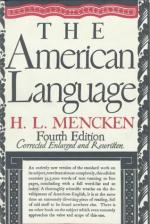|
This section contains 383 words (approx. 1 page at 400 words per page) |

|
Chapter 2.3 Summary
Next, Mencken focuses on the importance of creating new words in early America. This act of basing completely new words on new experiences or circumstances is what he and others call "coining." He concedes that it is hard to imagine Puritans coining such verbs, adverbs, adjectives, and substantives as to cowhide and to logroll, no-account and stumped, no-how and lickety-split, and bull-frog, hog-wallow, and hoe-cake. He asserts, however, that the new form of proletariat American, stubborn and rebellious, was more than willing and equally capable to bring inventiveness to the language. These people settled as early as 1628, were the "blackguard roisterers," the artisans and sailors who brought, not niceness, but enterprise and resourcefulness to the American language. They brought wildness to the axe and plow...along with such colorful words and phrases as bull-frog, canvas-back, mud-hen, cat-bird, razor-back, garter-snake, ground-hog, live-oak...
(read more from the Chapter 2.3 Summary)
|
This section contains 383 words (approx. 1 page at 400 words per page) |

|




